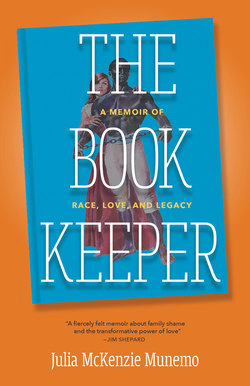Читать книгу The Book Keeper - Julia McKenzie Munemo - Страница 14
На сайте Литреса книга снята с продажи.
Оглавление4
MY FATHER DIED in a psychiatric treatment center in the Berkshire Mountains, one month after his admission. My father died in a place my mother called “the loony bin,” and every Saturday morning I watched Looney Tunes and tried to make the world match up.
My sister remembers visiting him in his room at Austen Riggs. Talks about all of his things, his “personal belongings” standing bare on the shelves and windowsills, naked and alone. She says those things on the shelves were what made her so sad. His things, separated from him and home and set there in that space, apart.
Nan says she looked at the things. She doesn’t remember if she looked at him. She doesn’t tell me now what they were, and at first I picture a television jail cell with pinup posters of pink ladies, a Bible, an awkwardly placed toilet. I have to blink to come back to this place, wipe the slate clear, and put the things of his that she remembers inside the room I know I was in. I see arranged against the backdrop of white walls and windows: toothpaste, shaving lotion, a framed photograph tilted so I can’t see who is in it, several little bottles of booze.
It’s another conversation and another sister—his—who tells me Riggs allowed its residents to drink. She calls them “residents” and not patients, as I expect. She is, after all, an analyst herself. She says she has learned things about Austen Riggs since his admission, things that would have given her pause had she known them before. That there were no locked wards. That the residents were free to come and go as they pleased. That there were no rules about what they brought into their rooms.
“I thought it was the Bellevue of the Berkshires,” she says. “I thought we were putting him somewhere safe,” she says. “I thought they could help him,” she says. And then, after a moment, she says, “This was a preventable death.” As though it’s the fault of those lenient laws or those tiny bottles of booze.
All I remember about Riggs is the thick red carpet and the brown rounded tips of my beat-up winter boots.
THE FACTS I learned about my father in the years before and just after his death were spare. He grew up in Brooklyn, the first child of a Jewish couple whose parents fled Poland and Russia early in the persecution. He was smart, went to Cornell when he was sixteen. After he met my mother—a WASP from Albany—at the Riviera Bar in the Village in the sixties, they traveled by boat to Tangier and then by train to Rome, where they lived for six or seven months. When they returned to the States, they eloped to the shores of Lake George in part because his parents would never accept my mother as his bride if she didn’t convert; Judaism is passed on to the children from the mother, not the father. And they eloped in part because it wasn’t the first wedding for either of them.
I knew he suffered from eczema, which sometimes covered his body from his head to his feet. I knew he was funny. I knew he was handsome. I knew he had a thick red mustache despite the black mop on his head.
And I knew he was a writer who had published some novels under his own name—George Wolk—and many more under various pseudonyms. I don’t remember a time when I didn’t understand that word, or that pulp fiction was called that because of the thick, cheap paper it was printed on, revealing its true worth. Did I know that when they lived in Rome, both of my parents wrote trashy novels under names not their own? Of course. But that was just something to talk about at a dinner party with loud laughter and tarnished sentimentality, my siblings and I squished along the top stair, elbows on knees, chins in hands. It was just part of the fabric of the past and, like any child who thinks her family is the only kind of family, I assumed it was nothing unique. You mean your folks didn’t write novels under pseudonyms in the sixties? Are you sure?
I knew that my father had renounced Judaism and was seeking enlightenment when he went to a Buddhist retreat in the mountains—a trip of ten days, from which he returned transformed indeed, but not in the way he had hoped. I knew that after some time—a year and half, maybe—of trying to live with those transformations, he allowed himself to be admitted to Austen Riggs. And I knew that when that place was unable to quiet the voices or the depression, he hanged himself in his hospital room.
* * *
THE TATTERED YELLOW quilt is tucked up to my chin. It’s dark outside Nan’s bedroom windows. I’ve never been in here this early in the morning. Josh is next to me on the bed, our backs up against the wall, the quilt pulled high around us, my head on his shoulder. Why were we called here? Nan scoots back to sit up but stays under her own blanket. Apart. The quilt is soft against my face. My thumb is in my mouth, my eyelids are droopy. I don’t hear the words Mom says, but when she speaks them we know he is dead.
